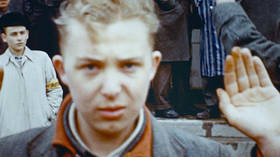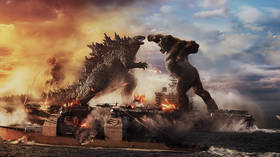New Nazi documentary ‘Final Account’ is a powerful & prescient warning for our identity politics obsessed age
Michael McCaffrey is a writer and cultural critic who lives in Los Angeles. His work can be read at RT, Counterpunch and at his website mpmacting.com/blog. He is also the host of the popular cinema podcast Looking California and Feeling Minnesota. Follow him on Twitter @MPMActingCo

‘Final Account’ is a collection of interviews with elderly, ordinary Germans recounting their experiences of life under the collective madness of the Nazi regime and their connection to, or complicity with, the Holocaust.
The film opens with a quote from Primo Levi. “Monsters exist, but they are too few in number to be truly dangerous. More dangerous are the common men, the functionaries ready to believe and to act without asking questions.”
Director Luke Holland, whose mother lost her family in the Holocaust and who himself died of cancer in 2020 after the film’s completion, but before its premiere, goes on to prove Levi’s thesis.
Holland began production in 2008, and ultimately interviewed 300 people for this fascinating project. His bare-bones, oral history approach works exquisitely well in revealing the banality of evil.
https://youtu.be/qobRIgAyQiY
Holland’s subjects were indoctrinated into the Nazi system early in life. The women went through the League of German Girls, the men the Hitler Youth. The males then graduated to the Waffen SS, some becoming concentration camp guards and one a member of Hitler’s elite bodyguards, the Leibstandarte.
Their recollections regarding the Holocaust run the gamut. Some claim to have known nothing, while others say they heard whispers and gossip, but were too afraid to speak up or act. Others give grudging admissions of complicity, while some admit the egregiousness of the crime, but doubt its scale. And one, the former member of the Leibstandarde, is unbowed by the weight of history.
He says the Fuhrer was a great leader with a good plan, except that the Jews should have been deported and not exterminated. He’s so unabashedly defiant he refuses to accept the Nuremberg ruling that the Waffen SS, of which he was a member, was a criminal organization because “then I would dirty myself.” His reasoning is wrapped in patriotism as he explains that the Nuremberg court wasn’t a German court, and therefore lacks authority in his eyes.
Other stories reveal how Jew hatred and the Holocaust were normalized. Stories of children being taught anti-Semitic songs in school, reading books with derogatory Jewish depictions and being indoctrinated by teachers into Nazi ideology are common.
Tales of visiting camps in order to get a cavity filled from a dentist who was a prisoner, or of routinely seeing prisoners escorted to and from camps, some being worked or starved to death slowly before their eyes, are mundanely recounted.
None of these revelations is met with tears or even overt remorse, just a stern, steely-eyed matter-of-factness.
The most compelling subject in the film is Hans Werk, a former member of the Waffen SS. Werk is at times elusive and at times defensive, but he evolves over a series of interviews.
The most electrifying moment in the entire film is when Werk goes to the site of the Wannsee Conference, where Nazi leadership made official the Final Solution policy, to speak to a group of college students about his guilt.
After saying he is ashamed of what he did as a member of the SS, these students push back. At first it seems they’re resistant because they think he’s lying about his contrition, then it becomes clear they’re actually angry with him for his shame. They call him a traitor for being ashamed of being German, and having fought for Germany.
This scene is compelling because it’s the only time the veneer of control recedes and the beast comes to the surface baring its teeth. Werk is shaken by the young men confronting him, and his horror at the realization that the disease of Nazism has passed to a new generation is readily apparent on his face as he pleads with them to “don’t let yourself be blinded.”
Werk’s warning fell on deaf ears in that room, and across the globe as well. The Nazi disease, or as my Jungian therapist friend describes it – the “not-see” disease – is back in our collective psyche with a vengeance. “Not seeing” the humanity of the other has reached epidemic proportions.
The dehumanizing sentiment of Nazism is readily apparent in recent videos of Jews rampaging on the streets of Israel attacking Arabs, Palestinians roaming the streets of New York targeting Jews, blacks viciously assaulting Asians and whites, militarized police brutalizing minorities and rioters wreaking racially motivated havoc, as well as in stories of Uighurs being held in Chinese concentration camps.
This ugly sentiment is also found in the establishment-approved Critical Race Theory, a shamelessly anti-white and anti-Asian ideology that demands people be judged by racial and ethnic categories instead of by the content of their character, which is now being used to indoctrinate students in schools and becoming the default setting in corporate America.
This industrialized effort at dehumanization is horrifyingly reminiscent of the process which created the legions of “functionaries ready to believe and to act without asking questions” which populate the Nazi nightmare of ‘Final Account’.
‘Final Account’ is not a great film. It is somewhat derivative in style, as evidenced by its repeated use of a melancholy cello played over shots of hollowed out concentration camps. But it is most certainly a powerful and prescient one.
It is cold comfort that the collaborators and perpetrators of Nazi evil in ‘Final Account’ will soon be dead of old age, for the spirit of Nazism is obviously alive and well in our world, living in all of our hearts, whether we have the courage to admit it or not.
The statements, views and opinions expressed in this column are solely those of the author and do not necessarily represent those of RT.



0 Comments:
Post a Comment
Subscribe to Post Comments [Atom]
<< Home